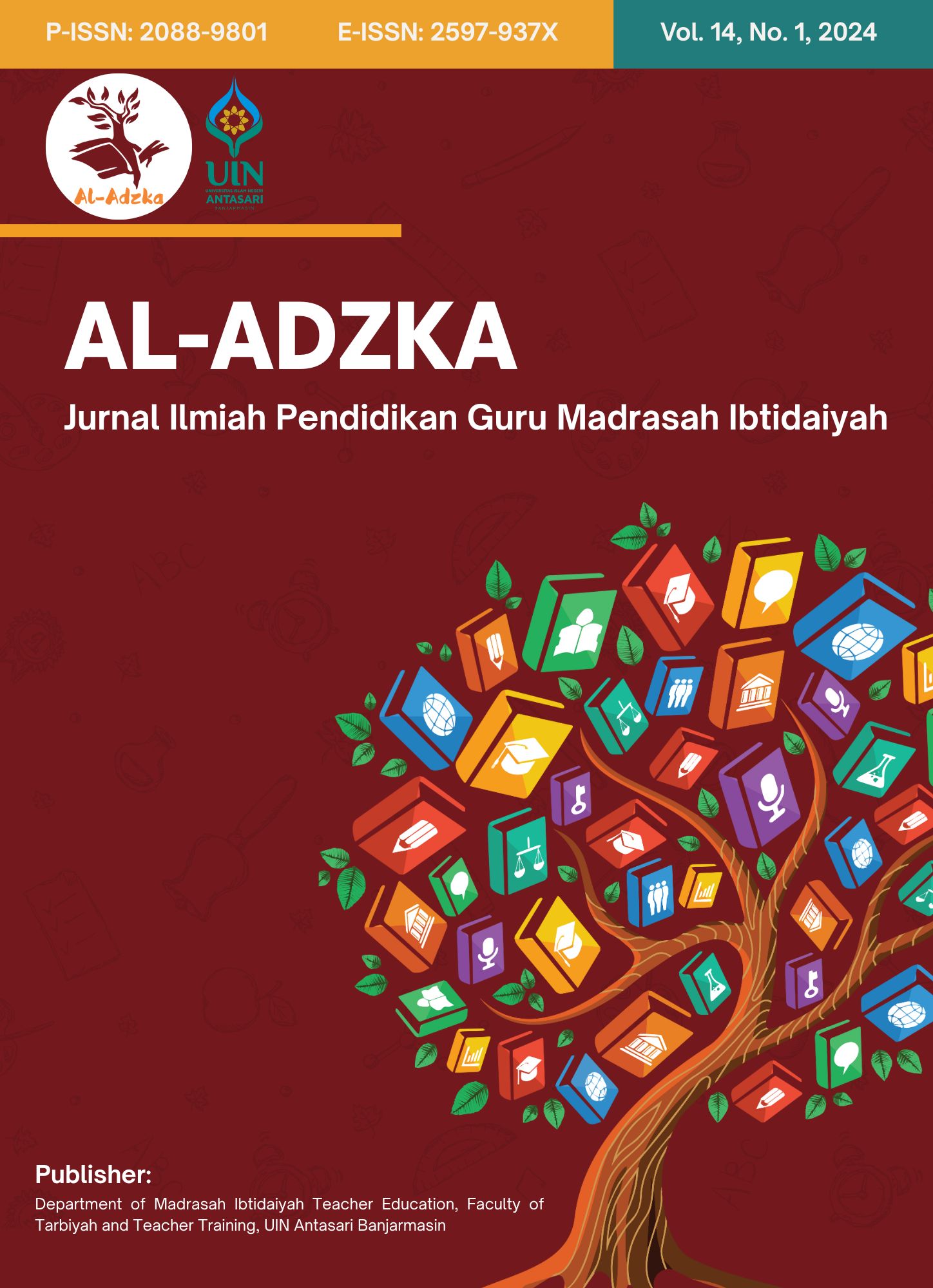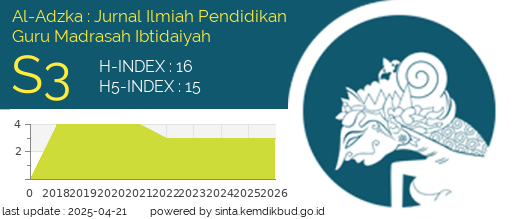Reading Guide and Gadget: How to Build Digital Literacy Through Primary Education Student Learning
DOI:
https://doi.org/10.18592/aladzkapgmi.v14i1.12506Keywords:
Reading Guide; Gadget; Digital Literacy; Primary EducationAbstract
This article aims to reconstruct reading guide learning strategies and devices as learning media to develop students' digital literacy in basic education. This is literature research. We gathered the data for this study by searching for relevant articles on the Google Scholar page. We then employ the content analysis technique to examine the collected data. The results show that the use of reading guide strategies and gadgets in learning to develop students' digital literacy in primary education is carried out through four stages, namely the introduction and preparation of WhatsApp groups, the pre-reading stage, the reading stage, and the post-reading stage. In all three stages, the teacher shares the reading link with students through the class WhatApp group, instructs them to read it using their gadgets, and asks them to respond to questions based on their reading results on the survey service within the class WhatApp. This study's limitation lies in its conceptual nature, necessitating the testing of its results through experimental research activities in primary education institutions.References
Abdullah, A. (2018). Pendekatan dan Model Pembelajaran yang Mengaktifkan Siswa. EDURELIGIA; Jurnal Pendidikan Agama Islam, 1(2), 45–62. https://doi.org/10.33650/edureligia.v1i2.45
Aeni, I. N., & Marzuki, I. (2023). Metode Pembelajaran Reading Guide untuk Meningkatkan Kemampuan Literasi Peserta Didik di SDN Tlogorejo. Jurnal Papeda: Jurnal Publikasi Pendidikan Dasar, 5(2), 141–147. https://doi.org/10.36232/jurnalpendidikandasar.v5i2.4546
Ariyati, D. (2020). Pembelajaran Bahasa Indonesia Berbasis Literasi Digital di Era 4.0: Tantangan dan Harapan. FKIP E-PROCEEDING; 2020: Seminar Nasional #5: Bahasa, Sastra, Dan Pembelajarannya Untuk Mempersiapkan Generasi Emas 2045. https://jurnal.unej.ac.id/index.php/fkip-epro/article/view/18683
Ayu, I. W., Zulkarnaen, Z., & Fitriyanto, S. (2022). Budaya Digital dalam Transformasi Digital Menghadapi Era Society 5.0. Jurnal Pengembangan Masyarakat Lokal, 5(1), 20–25. https://doi.org/10.58406/jpml.v5i1.922
Budiman, H. (2017). Peran Teknologi Informasi Dan Komunikasi Dalam Pendidikan. Al-Tadzkiyyah: Jurnal Pendidikan Islam, 8(1), 31. https://doi.org/10.24042/atjpi.v8i1.2095
Buehl, D. (2023). Classroom Strategies for Interactive Learning (4th ed.). Routledge. https://doi.org/10.4324/9781032680842
Bu’ulolo, Y. (2021). Membangun Budaya Literasi di Sekolah. Jurnal Bahasa Indonesia Prima (BIP), 3(1), 16–23. https://doi.org/10.34012/bip.v3i1.1536
Dada, D., Laseinde, O. T., & Tartibu, L. (2023). Student-Centered Learning Tool for Cognitive Enhancement in the Learning Environment. Procedia Computer Science, 217, 507–512. https://doi.org/10.1016/j.procs.2022.12.246
Dodgson, J. E. (2017). About Research: Qualitative Methodologies. Journal of Human Lactation, 33(2), 355–358. https://doi.org/10.1177/0890334417698693
Eminda Sari, N. W., Ni Luh Sukanadi, I Nyoman Suparsa, I Nyoman Adi Susrawan, & I Gusti Ayu Putu Tuti Indrawati. (2022). Pembelajaran Bahasa Indonesia Berbasis Literasi Digital di Era 4.0. J-ABDI: Jurnal Pengabdian Kepada Masyarakat, 1(12), 3351–3356. https://doi.org/10.53625/jabdi.v1i12.2062
Hidayah, I., Lubis, R., & Siregar, L. N. K. (2023). Analisis Pembelajaran Aktif Reading Guide dalam Pembelajaran Bahasa Indonesia di MIS Kesuma LKMD Namorambe. IJTIMAIYAH Jurnal Ilmu Sosial Dan Budaya, 6(2), 1. https://doi.org/10.30821/ijtimaiyah.v6i2.14677
Ibda, H. (2022). Inovasi Pendidikan dan Pembelajaran Bahasa Indonesia Sekolah Dasar di Era Digital. Pilar Nusantara.
Idhartono, A. R. (2022). Literasi Digital Pada Kurikulum Merdeka Belajar Bagi Anak. Devosi : Jurnal Teknologi Pembelajaran, 12(2), 91–96. https://doi.org/10.36456/devosi.v6i1.6150
Intaniasari, Y., & Utami, R. D. (2022). Menumbuhkan Budaya Membaca Siswa Melalui Literasi Digital dalam Pembelajaran dan Program Literasi Sekolah. Jurnal Basicedu, 6(3), 4987–4998. https://doi.org/10.31004/basicedu.v6i3.2996
Kuhlthau, C. C. (2010). Guided Inquiry: School Libraries in the 21st Century. School Libraries Worldwide, 16(1), 17–28. https://doi.org/10.29173/slw6797
Lince, L. (2022). Implementasi Kurikulum Merdeka untuk Meningkatkan Motivasi Belajar pada Sekolah Menengah Kejuruan Pusat Keunggulan. Prosiding Seminar Nasional Fakultas Tarbiyah Dan Ilmu Keguruan IAIM Sinjai, 1, 38–49. https://doi.org/10.47435/sentikjar.v1i0.829
Mahardika, I. G. N. A. W. (2022). Literasi Digital dan Kemampuan Berpikir Kritis sebagai Keterampilan Dasar Guru Masa Kini. Sang Acharya: Jurnal Profesi Guru, 3(2), 70–83. https://doi.org/10.25078/sa.v3i2.3247
Mahmud, M. N., & Wulansari, A. (2018). Penggunaan gadget untuk Meningkatkan Pembelajaran yang Efektif. Prosiding SNP (Seminar Nasional Pendidikan) Prodi Pendidikan Akuntansi FKIP Universitas Muhammadiyah Surakarta, 3(1), 58–63.
Maisarah, M., Lestari, T. A., & Sakulpimolrat, S. (2022). Urgensi Pengembangan Media berbasis Digital Pada Pembelajaran Bahasa Indonesia. EUNOIA (Jurnal Pendidikan Bahasa Indonesia), 2(1), 65. https://doi.org/10.30821/eunoia.v2i1.1348
Manshur, A., Aziz, S., & Qomariyah, N. (2022). Pengaruh Strategi Reading Guide terhadap Prestasi Belajar Siswa Madrasah Tsanawiyah. Scaffolding: Jurnal Pendidikan Islam Dan Multikulturalisme, 4(2), 261–268. https://doi.org/10.37680/scaffolding.v4i2.1425
Marín, V. I., & Castañeda, L. (2023). Developing Digital Literacy for Teaching and Learning. In O. Zawacki-Richter & I. Jung (Eds.), Handbook of Open, Distance and Digital Education (pp. 1089–1108). Springer Nature Singapore. https://doi.org/10.1007/978-981-19-2080-6_64
NidaGökçe Narin. (2021). A Content Analysis of the Metaverse Articles. Journal, 1(1), 17–24.
Poernomo, E., Kurniawati, L., & Atiqoh, K. S. N. (2021). Studi Literasi Matematis. ALGORITMA: Journal of Mathematics Education, 3(1), 83–100. https://doi.org/10.15408/ajme.v3i1.20479
Quintero-Angel, M., Duque-Nivia, A. A., & Molina-Gómez, C. A. (2024). A teaching strategy based on active learning which promotes strong sustainability that empowers students to have a different type of relationship with the environment. Environmental Education Research, 30(4), 560–579. https://doi.org/10.1080/13504622.2023.2211757
Ramdani, N. G., Fauziyyah, N., Fuadah, R., Rudiyono, S., Septiyaningrum, Y. A., Salamatussa’adah, N., & Hayani, A. (2023). Definisi Dan Teori Pendekatan, Strategi, Dan Metode Pembelajaran. Indonesian Journal of Elementary Education and Teaching Innovation, 2(1), 20. https://doi.org/10.21927/ijeeti.2023.2(1).20-31
Reddy, P., Chaudhary, K., & Hussein, S. (2023). A digital literacy model to narrow the digital literacy skills gap. Heliyon, 9(4), e14878. https://doi.org/10.1016/j.heliyon.2023.e14878
Sholeh, M. (2021). Transformational Leadership: Principal Intellectual Stimulation In Improving Teacher Competences. Al-Talim Journal, 28(2), 167–179. https://doi.org/10.15548/jt.v28i2.708
Sholeh, M., Kholis, N., & Mufidah, N. (2022). Madrasah Principal Leadership in Digital Transformation at Madrasah Ibtidaiyah: A Case Study. Dinamika Ilmu, 151–166. https://doi.org/10.21093/di.v22i1.4241
Sutomo, Moh. (2019). Penerapan Reading Guide Dalam Pembelajaran Di Madrasah. Auladuna : Jurnal Prodi Pendidikan Guru Madrasah Ibtidaiyah, 1(1), 134–149. https://doi.org/10.36835/au.v1i1.169
Wiwik Astuti, N. M., Werdhiana, I. K., & Wahyono, U. (2021). Impacts of direct disaster experience on teachers’ knowledge, attitudes and perceptions of disaster risk reduction curriculum implementation in Central Sulawesi, Indonesia. International Journal of Disaster Risk Reduction, 53, 101992. https://doi.org/10.1016/j.ijdrr.2020.101992
Yu, Z., Xu, W., & Sukjairungwattana, P. (2023). Motivation, Learning Strategies, and Outcomes in Mobile English Language Learning. The Asia-Pacific Education Researcher, 32(4), 545–560. https://doi.org/10.1007/s40299-022-00675-0
Yulanda, N. (2017). Pentingnya Self Regulated Learning bagi Peserta Didik dalam Penggunaan Gadget. Research and Development Journal of Education, 3(2). https://doi.org/10.30998/rdje.v3i2.2013
Yusup, P. M., & Saepudin, E. (2017). Praktik Literasi Informasi dalam Proses Pembelajaran Sepanjang Hayat. Jurnal Kajian Informasi Dan Perpustakaan, 5(1), 79. https://doi.org/10.24198/jkip.v5i1.11387
Zaini, H. (2017). Teori Pembelajaran Bahasa dan Implementasi Strategi Pembelajaran Aktif. An Nabighoh Jurnal Pendidikan Dan Pembelajaran Bahasa Arab, 19(2), 194. https://doi.org/10.32332/an-nabighoh.v19i2.999
Downloads
Published
How to Cite
Issue
Section
License
Copyright (c) 2024 Rina Rizki Amalia, Abdul Wachid Bambang Suharto

This work is licensed under a Creative Commons Attribution 4.0 International License.
Authors who publish with this journal agree to the following terms:
- Authors retain copyright and grant the journal right of first publication with the work simultaneously licensed under a Creative Commons Attribution 4.0 International that allows others to share the work with an acknowledgement of the work's authorship and initial publication in this journal.
- Authors are able to enter into separate, additional contractual arrangements for the non-exclusive distribution of the journal's published version of the work (e.g., post it to an institutional repository or publish it in a book), with an acknowledgement of its initial publication in this journal.
- Authors are permitted and encouraged to post their work online (e.g., in institutional repositories or on their website) prior to and during the submission process, as it can lead to productive exchanges, as well as earlier and greater citation of published work.












